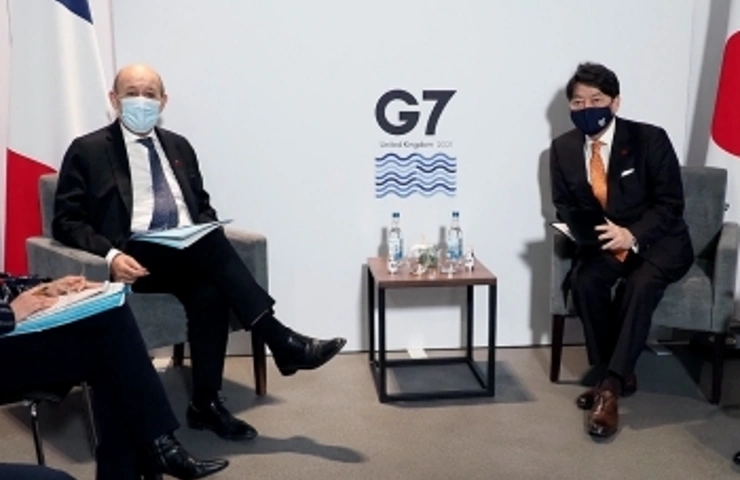

Japanese and French foreign ministers have upped their engagements (Photo: Japanese ministry of foreign affairs)
<p>
Japan and France decided on Thursday to strengthen cooperation in the Indo-Pacific region with tensions over China&#39;s muscle flexing targeting South China Sea (SCS) neighbours and fears over North Korea&#39;s successive missile tests.</p>
<p>
The four ministers of the two democracies–Japanese Foreign Minister Yoshimasa Hayashi and Defence Minister Nobuo Kishi and French counterparts Jean-Yves Le Drian and Florence Parly respectively, interacted virtually to discuss rising tensions in the region.</p>
<p>
The two countries have stepped up engagments after the US, the UK and Australia signed the AUKUS deal for supply of nuclear submarines to Australia.<br />
<br />
A joint statement issued after the 2+2 meeting said: &quot;The four ministers affirmed their commitment to promoting cooperation to contribute to the rules-based, free and open Indo-Pacific&quot;, reports Japanese <a href="https://english.kyodonews.net/news/2022/01/2fd5b544c368-japan-france-begin-ministerial-level-security-talks.html">news agency <em>Kyodo</em></a>. The joint statement also referred to &quot;peace and stability in the Taiwan Strait.&quot;<br />
<br />
Significantly, the two governments also plan to ease restrictions on the transportation of weapons and supplies for joint training. The ministers also shared satisfaction over military exercises with the US, Australia and India in 2021.<br />
<br />
Regarding North Korea, the meet said that UN Security Council (UNSC) resolutions related to the dismantling of Pyongyang&#39;s weapons of mass destruction should be implemented.<br />
<br />
The four ministers shared &quot;serious concerns&quot; over China&#39;s disputes with countries in the East and South China Sea where the communist regime has territorial issues with Japan, Taiwan, Indonesia, Vietnam, the Philippines and many others.<br />
<br />
With China taking over coral reefs and islands in the SCS, Tokyo responded by calling for keeping the Indo-Pacific waters &quot;free and open Indo-Pacific&quot; (FOIP) as a counter measure to Chinese military aggression.<br />
<br />
Tokyo has raised a consistent and a strident alarm with the US and European allies over the threat China and North Korea pose to peace and stability in the region.<br />
<br />
Highlighting the importance of the 2+2 talks between the four ministers, <a href="https://asia.nikkei.com/Politics/International-relations/Indo-Pacific/Japan-s-got-the-2-2-bug-engaging-with-France-India-and-Indonesia"><em>Nikkei Asia </em>says that</a> Japan and France have held seven meetings in just one year. It adds that the 2+2 format of foreign policy and defence issues is being encouraged by US President Joe Biden in an effort to contain China.<br />
<br />
Compared with not a single 2+2 taking place during previous US president Donald Trump&#39;s presidency, Japan is now holding such meets with an amazing frequency over the last one year.<br />
<br />
Holding the first 2+2 meeting with the US in 1990, Japan has since then held similar meets with Russia, France, the UK, Germany, India and Indonesia.<br />
<br />
Both France and Japan are busy weaving numerous partnerships across the globe with like-minded countries like India, Australia and Indonesia–almost all of who have been at the end of Beijing&#39;s wolf warrior diplomacy.<br />
<br />
India has come up as a pivot to both nations in their China-centric policies.<br />
<br />
With China intruding into Indian territory in 2020, France and India have witnessed increasing defence cooperation. India procured the high-tech Rafale aircraft and is seeking French help in submarines. Defence ministry Florence Parly was in New Delhi in December to strengthen that relationship. Late last year, the two nations also held talks over the situation in Afghanistan and tackling the menace of global terror and curbing terror-finance.<br />
<br />
Japan too has been partnering India in curbing Chinese influence in South Asia and Southeast Asia. The two nations are cooperating in providing development assistance in countries like Sri Lanka and Myanmar. They are also looking at connecting South Asia with Southeast Asia through highways and road networks through India&#39;s north-east.</p>
In a major boost to India's coastal defence capabilities, the Indian Navy on Wednesday commissioned…
Volker Turk, the UN High Commissioner for Human Rights, on June 17 expressed concern over…
Prime Minister Narendra Modi addressed the G7 Outreach Session on the theme 'Energy Security: diversification,…
Prime Minister Narendra Modi held a telephonic conversation with US President Donald Trump on the…
The launch of Axiom Mission 4, the fourth private astronaut mission to the International Space…
The Embassy of Iran in India on Wednesday shared a statement made by the Director-General…